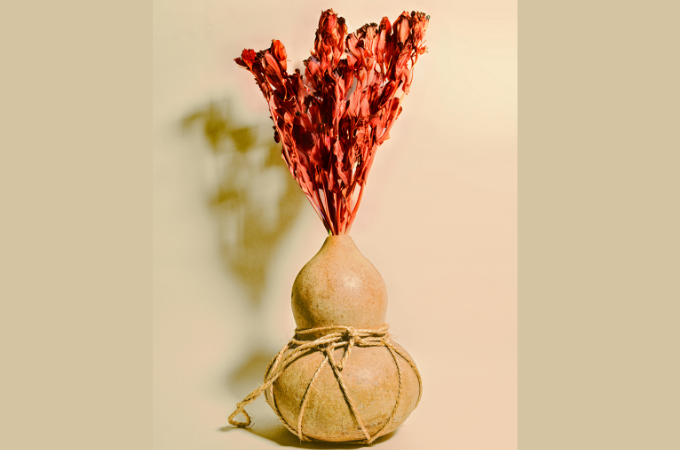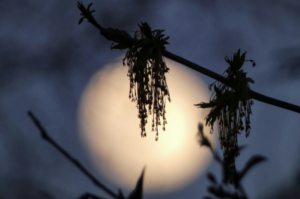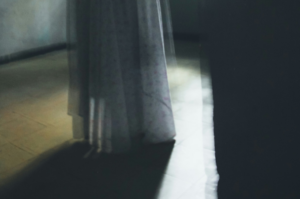
Screams erupted from the hut. Kathurima’s drunken blows landed on Kendi’s head. She had been asleep, waiting for her husband to bring supper home. Now, she shielded herself from his fists. Yet again.
Kendi had only just seen her first blood when Kathurima was chosen for her. She knew he was a good young man, a competent farmer, caring for animals and crops alike. He was the last remaining bachelor in his age set. The wedding night went as expected. In a few months, Kendi would welcome their first child. Kathurima, it seemed, had done his duty as a man. He returned to the farm and the livestock. And then he found the brew.
Kendi did her duties as a good wife. She kept the hut clean, mended the thatched roof, cooked whatever Kathurima brought home. Despite her efforts, she could not understand her husband’s actions. Could he not see her belly growing? Surely, no other women suffered her fate? “You are young, Kendi,” said Nkatha, her mother. “Even your father was like that.” Her smile was faint, “He is resting with his ancestors now, and I can rest, too.”
“Be strong, Kendi,” said Ntinyari, her grandmother. “This is what makes us true women.”
But one day, Kathurima’s blow landed in Kendi’s belly. She curled up on the floor. Her mind went blank. She had enough. When Kathurima’s rage died away and the drunken sleep took him completely, Kendi made a decision. If her people would not help her, only one person would.
The next day, after Kathurima went to the farm, Kendi fearfully traced the path that only the weak and desperate followed. It led through the shrubs to a ramshackle hut. She stood at a distance, scanning the hut for movement.
“Where did you come from, young girl?” Kendi nearly screamed. It was M’Aritho, the witchman, appearing from nowhere, suddenly beside her. “Don’t worry, young one,” he soothed. “Tell me what brings you to see my old bones today.”
The two walked slowly toward the hut. “It is my husband,” began Kendi, suddenly ashamed.
“What has he done, young one?” The words failed her. Why would she tell an old man about her troubles? M’Aritho waited patiently as they walked.
“He is a good man,” Kendi began. “Everybody says he is the best farmer we have. He knows the sowing and the harvesting. He knows the breeding and the calving. There is always meat for us to eat.”
They reached the weather-beaten hut. M’Aritho entered first, as was the custom. He sat on his three-legged stool and motioned for Kendi to enter, as was the custom. Kendi winced as she bent through the door, and groaned as she sat down across the witchman. That was not the custom. “If he is such a good man,” said M’Aritho quietly, “Why does he kick you like a donkey?” And Kendi wept. Months of sorrow trickled down her face. M’Aritho had seen many like her in his time, but none so young. He waited for the poor child to cry all her pain away. And then he spoke. “I have what you need. Otherwise, my name would not be M’Aritho.”
Kendi straightened up. The old man, the Great Seer, would shortly produce a charm or an amulet for her, or a potion for her husband’s food. But nothing happened. M’Aritho only watched her. He shook his head, “She is but a child,” M’Aritho said, more to himself than to her, “she might not survive.”
“I am a child, but I am with child, too,” said Kendi. “If you cannot help me, neither of us will survive.” That, too, was not the custom. M’Aritho expected a desperate plea, a bargain. But he only saw courage, and a stubbornness worthy of admiration.
“I need something from you, before I can prepare your potion.” Kendi nodded. “One hair from a lion’s mane.”
***
There was a lion in the forest that surrounded the village. He belonged in the distant plains, but he ventured into the forest to scout his territory. Every other night, he would roar and roar, claiming his share of the land. He never harmed the villagers, though the villagers kept a respectful distance.
On this night, Kendi took her chances. She needed only one hair, after all. She stood in the bush shrouded by darkness. Her heart pounded so loudly that she thought the whole village would hear it. In her hand was a chunk of meat wrapped in hide. She had hidden it away after Kathurima brought it home for supper. After all, he was too drunk to notice that the meal was less meat and more potatoes. Then she snuck away when he was sound asleep. She would throw the meat at the lion, then approach it while it ate, yank on its mane, and run for dear life. Then M’Aritho would give her the medicine to save her marriage and her unborn child. Kendi prayed to all her ancestors for courage. But courage failed when the lion appeared.
He was a majestic creature, fearsome and powerful. To him, Kendi was just like the meat wrapped in hide. She froze in awe and terror – until the lion roared. Kendi threw the meat down and ran, too scared to scream. By the time she got to the hut, she decided M’Aritho was not complete in his head. How could he send a mere girl like her to play with a lion? But the lion smelled the meat on the ground. He teased the hide open with his enormous paws and teeth, chewed and crunched the bones, and returned to his roars. In the hut, Kendi watched her sleeping husband, sprawled on the ground. She imagined going back to M’Aritho empty-handed, battered and bruised again, crying in her cowardice.
But she could not bear one more blow. And M’Aritho was the greatest witchman of his time. And he wanted the lion’s hair.
***
Kendi stood in the bush again, meat in hand, trembling like a twig. The mantra ran in her mind over and over. Don’t run. Don’t run. Don’t run.
The lion appeared. Kendi felt him before she could see him. She watched and listened as the lion roared. He picked up the scent of the meat. He looked straight at her. Kendi threw one piece of meat at him, and waited. The lion waited, too. He seemed to decide that Kendi was the food-bringer, not the food. So, he ate the first piece. Kendi stepped closer and threw a second piece at the lion. He chewed it up happily. One last piece remained. Kendi stepped closer still, close enough to touch the great lion. She tossed the meat near his feet. As he lowered his head to eat, Kendi reached out, grabbed the lion’s mane and tugged gently.
***
“M’Aritho, I am here,” said Kendi. She stood outside the old man’s hut and waited for his welcome.
“My child,” said M’Aritho warmly. “Where have you been?” Kendi entered the hut and sat at the Great Seer’s feet. From the folds of her skirts, Kendi produced a section of cloth, tightly wrapped to the size of an index finger. She presented it to the witchman. M’Aritho did not need to open the parcel to know what was in it. He took the lion’s hair and nodded. “Now you are ready.” M’Aritho rummaged around his hut, chanting and muttering. He found what he sought: a small old gourd with a tight skin cork.
“This,” he explained, handing the gourd to Kendi, “is a potent medicine. You must follow my instructions carefully. Otherwise, it will kill you. Do you understand?”
“Yes, M’Aritho,” said Kendi, holding the gourd with reverence.
“Every morning, as soon as you wake up, take a sip from this gourd,” said the witchman. “Only a small sip to fill your mouth, not your cheeks. Do not swallow the medicine, either, my girl. It will end your life! Only spit it out after Kathurima goes to the farm and be free for the day. But take a fresh sip before Kathurima comes home. Do you understand?” Kendi hesitated. She saw herself in her hut, on the ground, shielding her face and her belly. The witchman waited.
After the horrors faded from her mind, Kendi said, meekly, “Yes, M’Aritho.”
“Come back when the last drop is finished.”
***
When Kendi reached her hut, it was nearly time for Kathurima’s return. She sat in the kitchen and eyed the small gourd fearfully. She heard her husband’s drunken singing from a short distance away. She uncorked the gourd and sniffed: nothing. She took a small sip, as instructed, waiting for a bitter or burning taste: nothing. Before she could wonder at the strange concoction, Kathurima was at the door.
“Woman!” Kendi hurried to her husband. Kathurima shoved his sacks of tools and foodstuff into her arms. She turned, heading for the kitchen. “And what do we say?” demanded Kathurima. Kendi froze. The medicine was in her mouth. She could not dare swallow it or spit it out. But she could not speak her thanks, as her husband expected her to. “Ungrateful whore! What do we say?” Kathurima was on her. But she could not scream or beg for him to stop. The medicine was in her mouth. When he finally exhausted his blows on her, Kendi cooked and served her husband, weeping silently, medicine intact. As soon as he started to snore, Kendi crept out of the bed, went outside the hut, and spat the medicine out. It tasted of blood.
At first light, Kendi was awake. She sipped the medicine afresh and stirred the pot of gruel for her husband’s breakfast. Kathurima woke up, hungover as usual, and took the calabash of gruel from her hands. Something was not right, but he could not tell what it was. He ate his gruel, took up his tools, and left for the farms. Only then did Kendi spit the medicine out of her mouth.
That night, Kathurima was more angry than drunk. “What is wrong with you?” he demanded. “Open that mouth, Kendi, or I swear today is your last day on this earth. Speak, you stupid woman!” The medicine remained in her mouth. Kathurima raised his fists. Kendi braced herself. “Useless!” he shouted, stomping off to the bedroom. Kendi was too stunned to move. Her body knew what to expect. When it did not come, she did not know what to do. She sat on the floor and waited. Soon, she heard Kathurima snoring in the next room. Kendi stood up slowly and went outside, to the back of the hut, and spat the medicine out. No blood today.
The next night, Kathurima was more frustrated than drunk. “What crime have I committed against you, Kendi? Even a goat cries in the field, even the maize in the farm will sing in the wind. But you!” The medicine remained intact, and no blows fell. Kathurima went off to sleep. Kendi was astonished. Another night without fresh bruises? How? At the back of the hut, she spat out the medicine in wonderment.
The next night, Kathurima was more anguished than drunk. “My wife,” he pleaded, “Just tell me what happened. Are you sick? Are you angry with me? I come home and you don’t talk. You just move about like a ghost. How do you think I feel? Just say what you want. Do you want a gift? A bigger hut? Fine, be that way. I won’t talk to you anymore.” Another painless night. She was in awe of the powerful medicine from the Great Seer.
To Kendi’s further confusion, Kathurima returned home early the next day. She could not smell the brew on him. But she went about her wifely duties. Kendi found her husband in the doorway, watching her keenly. The torment in his eyes moved her heart. She still could not speak, but she smiled shyly at him. And he smiled back. It became harder and harder for Kendi to keep the medicine in her mouth. She could see and feel the animosity fading from her husband. Still, she obeyed the witchman. Until one evening, just before Kathurima returned from the farm, she tipped the last of the medicine between her lips. The gourd was finally empty.
Kendi was worried. Kathurima had stopped beating her. Sometimes, he did not drink at all. Her bruises had healed. Would her husband return to his old ways if she spoke again? She could not risk it. She would rather be mute for the rest of her life. Without the medicine, Kendi grew more and more restless. While Kathurima slept, she snuck out into the night.
“Who is bothering an old man at this hour?” M’Aritho grumbled. The urgent knocking on his hut was enough to rouse the ancestors. “Forgive me, Great Seer,” pleaded Kendi. “The medicine is finished!”
“What medicine, young girl?” snapped M’Aritho from the depths of his hut. “I gave you no such thing!”
“But you did!”
Against all customs, Kendi entered the witchman’s hut uninvited. She presented the empty gourd to him. M’Aritho rummaged for an ember in his dying fire and held it out in front of Kendi. In the dim glow, M’Aritho remembered. And then he laughed. “My dear child,” he said gently. “I gave you no medicine. But I see you are well, and so is your belly.”
“M’Aritho, please give me more medicine. If Kathurima starts to beat me again–”
“What makes you think he will?”
“If there is no more medicine–”
“My girl,” soothed M’Aritho, “are you not the same one who brought the hairs of a lion?” How could she have forgotten? The terrors of the night, the stolen pieces of meat, the roaring, the running, the pain… and yet, here she was. “If you can tame a lion, what is a husband?”
He held out his palm for the gourd. Kendi reverently surrendered it to him. “I have really suffered without my water gourd, you know,” said M’Aritho, shaking his head.
“Your water gourd?” said Kendi, confused.
“Yes, child! What did you think was in it?”
“It was a powerful potion. You said so yourself.”
“Well, did it smell of anything? Taste of anything?”
“No, but…”
M’Aritho chuckled. “Go home, my girl. Rest well. Your husband will not bother you again.” The witchman shut his door.
Kendi found her way back to her hut in a daze. All this time, the potion was just water? In the bush, the lion roared once more, and Kendi laughed. The medicine may be water, but the lion was real and true. She arrived at her hut just before dawn. With a smile, Kendi roused Kathurima, “Good morning, my husband.”
Photo by Girl with red hat on Unsplash










Chisom February 06, 2024 06:16
I've heard something like this before, maybe like a proverb or an idiom but you told this story beautifully. I liked the repetition, it was an engaging story with morals.